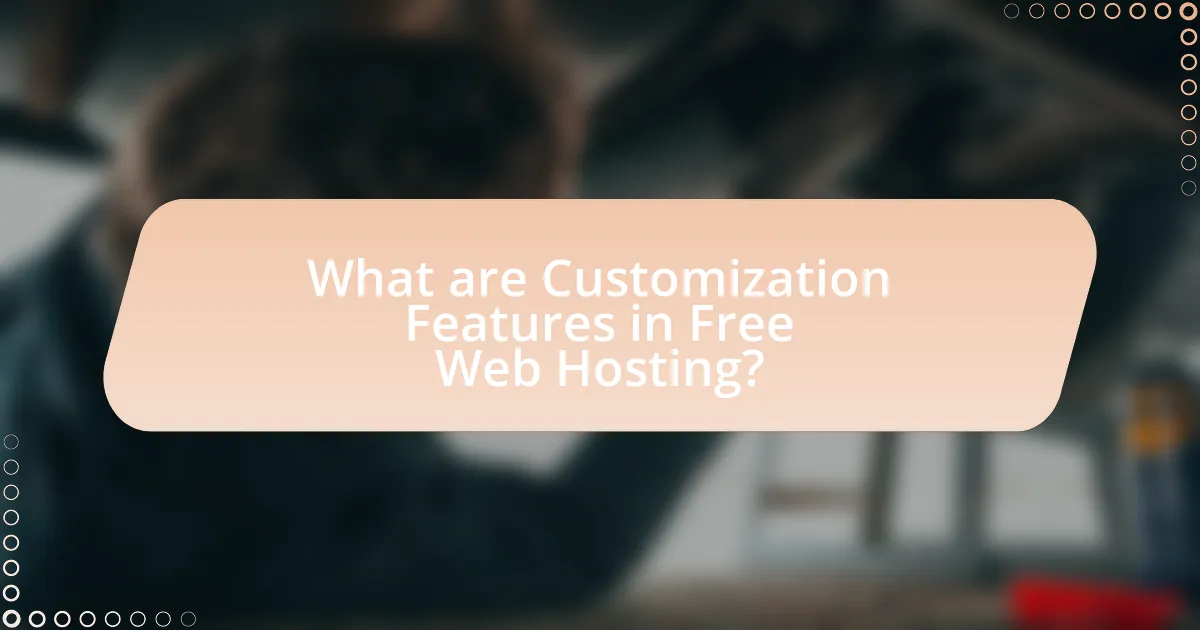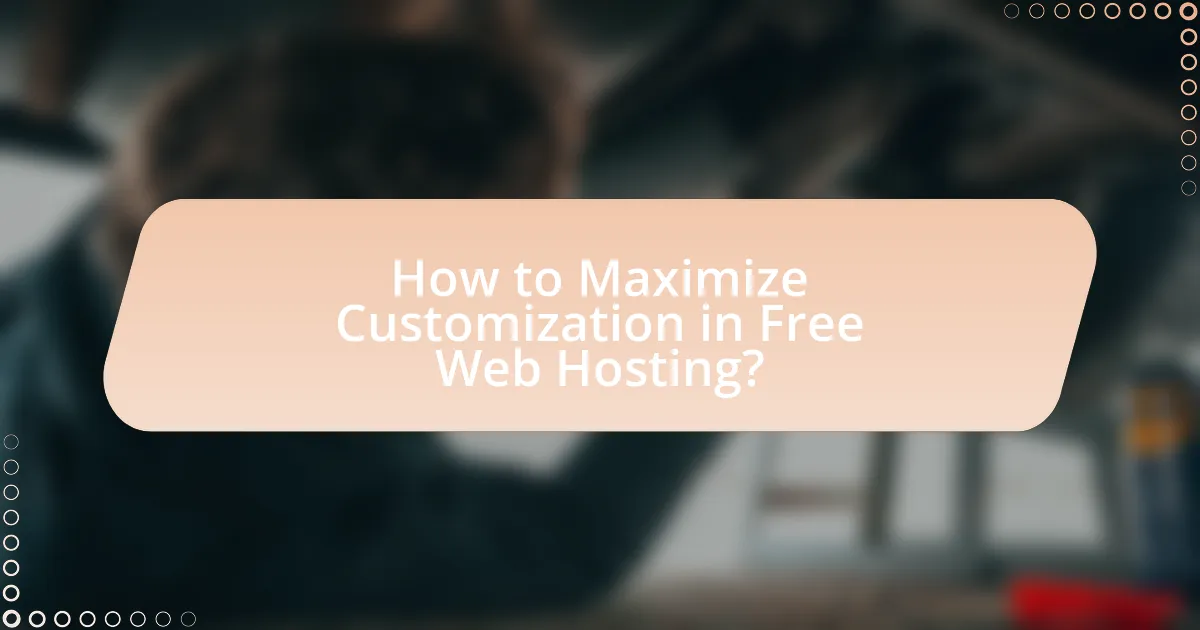Customization features in free web hosting enable users to personalize their websites according to individual needs and preferences. Key aspects include template selection, layout modifications, and the integration of custom scripts or plugins, which enhance user experience and brand identity. The article explores the various types of customization options available, how they differ among hosting providers, and their significance for website owners. It also highlights best practices for effective customization, common pitfalls to avoid, and resources for learning about these features, ultimately emphasizing the importance of personalization in establishing a distinct online presence.

What are Customization Features in Free Web Hosting?
Customization features in free web hosting allow users to tailor their websites according to specific needs and preferences. These features typically include options for selecting templates, modifying layouts, and adding custom scripts or plugins. For instance, many free web hosting services provide a range of pre-designed templates that users can choose from, enabling them to create a unique look for their site without extensive coding knowledge. Additionally, users may have access to a control panel that facilitates easy adjustments to site settings, such as domain names and email accounts. These customization options enhance user experience and help in establishing a distinct online presence.
How do customization features enhance user experience in free web hosting?
Customization features enhance user experience in free web hosting by allowing users to tailor their websites to meet specific needs and preferences. These features enable users to modify layouts, choose color schemes, and add personalized content, which fosters a sense of ownership and satisfaction. Research indicates that personalized experiences can increase user engagement by up to 80%, demonstrating the importance of customization in retaining users. Furthermore, customization options can improve usability by allowing users to create intuitive navigation and design elements that align with their target audience, ultimately leading to a more effective online presence.
What types of customization options are typically available?
Customization options in free web hosting typically include template selection, domain name customization, and plugin or app integration. Template selection allows users to choose from various pre-designed layouts to suit their website’s aesthetic and functional needs. Domain name customization enables users to personalize their web address, often with subdomains provided by the hosting service. Plugin or app integration allows users to enhance functionality by adding features such as contact forms, SEO tools, or e-commerce capabilities, which can be easily implemented through the hosting platform’s interface. These options are designed to provide users with flexibility and control over their website’s appearance and functionality.
How do these options vary between different free web hosting providers?
Free web hosting providers vary significantly in their customization options, with differences in features such as control panel interfaces, available templates, and the ability to modify code. For instance, some providers like Wix offer limited customization through drag-and-drop interfaces, while others like InfinityFree allow full access to HTML and CSS for deeper modifications. Additionally, the extent of branding and advertising imposed by the provider can differ; some may display their ads prominently, while others might offer ad-free experiences with certain limitations. These variations impact user experience and the level of personalization achievable on each platform.
Why is customization important for website owners using free hosting?
Customization is important for website owners using free hosting because it allows them to create a unique brand identity and enhance user experience. Free hosting services often come with limited features and generic templates, which can make websites look unprofessional and indistinguishable from others. By customizing their sites, owners can tailor the design, layout, and functionality to better reflect their brand and meet the specific needs of their audience. This differentiation is crucial, as studies show that 94% of first impressions relate to design, emphasizing the importance of a visually appealing and personalized website.
What impact does customization have on branding and identity?
Customization significantly enhances branding and identity by allowing businesses to tailor their offerings to meet specific customer preferences. This personalization fosters a deeper emotional connection between the brand and its audience, leading to increased customer loyalty. Research indicates that 80% of consumers are more likely to make a purchase when brands offer personalized experiences, demonstrating the direct correlation between customization and consumer engagement. Furthermore, brands that effectively utilize customization can differentiate themselves in a crowded market, thereby strengthening their unique identity and positioning.
How can customization improve functionality and user engagement?
Customization enhances functionality and user engagement by allowing users to tailor their experience to meet specific needs and preferences. When users can modify features, layouts, and settings, they are more likely to find the platform intuitive and aligned with their goals, leading to increased satisfaction. Research indicates that personalized experiences can boost user retention rates by up to 30%, as users feel a greater sense of ownership and relevance in their interactions. Furthermore, customization can streamline workflows by enabling users to prioritize tools and features that are most beneficial to them, thereby improving overall efficiency and engagement.

What Specific Customization Features Can You Expect?
In free web hosting, you can expect specific customization features such as domain name selection, website templates, and control panel access. Domain name selection allows users to choose a unique web address, enhancing brand identity. Website templates provide pre-designed layouts that can be modified to suit individual preferences, facilitating ease of use for those without coding skills. Control panel access enables users to manage their hosting settings, including file uploads, email accounts, and database management, ensuring a tailored experience. These features are commonly offered by various free web hosting providers, making them essential for users seeking personalization in their web presence.
What are the common design customization options in free web hosting?
Common design customization options in free web hosting include template selection, color schemes, font choices, and basic layout adjustments. Users typically have access to a variety of pre-designed templates that can be modified to suit their branding needs. Additionally, many platforms allow users to change color palettes and select different fonts to enhance visual appeal. Basic layout adjustments, such as rearranging elements or adding widgets, are also commonly available, enabling users to create a more personalized website experience. These options are standard across many free web hosting services, providing users with essential tools to customize their sites effectively.
How can users modify templates and themes?
Users can modify templates and themes by accessing the customization options provided in the web hosting platform’s dashboard. Most platforms offer a user-friendly interface that allows users to change colors, fonts, layouts, and images without needing coding skills. Additionally, users can upload their own CSS or HTML files for more advanced modifications. This capability is supported by the fact that many free web hosting services include built-in theme editors and template libraries, enabling users to personalize their websites effectively.
What tools are available for customizing website layouts?
Various tools are available for customizing website layouts, including website builders, content management systems (CMS), and CSS frameworks. Website builders like Wix and Squarespace offer drag-and-drop interfaces that allow users to easily modify layouts without coding knowledge. Content management systems such as WordPress provide themes and plugins that enable extensive customization options for layout design. Additionally, CSS frameworks like Bootstrap and Foundation offer pre-designed components and grid systems that facilitate responsive layout creation. These tools collectively empower users to create tailored website layouts efficiently.
What functionality customization features are typically offered?
Functionality customization features typically offered in free web hosting include website builders, template customization, domain name options, and plugin support. Website builders allow users to create and design their sites without coding knowledge, while template customization enables users to modify the appearance and layout of their chosen templates. Domain name options often include subdomains or the ability to connect a custom domain, and plugin support allows for the integration of additional functionalities, enhancing the site’s capabilities. These features are essential for users seeking to tailor their online presence according to their specific needs and preferences.
How can users add plugins or extensions to enhance their site?
Users can add plugins or extensions to enhance their site by accessing the platform’s plugin or extension marketplace, typically found in the site’s dashboard or settings menu. Most web hosting services provide a dedicated section where users can browse, install, and manage various plugins or extensions that improve functionality, design, or performance. For example, WordPress users can navigate to the “Plugins” section, search for desired plugins, and click “Install” to add them to their site. This process is supported by extensive documentation and community forums that offer guidance on selecting and configuring plugins effectively.
What options exist for customizing domain names and URLs?
Options for customizing domain names and URLs include using subdomains, URL forwarding, and custom domain registration. Subdomains allow users to create distinct sections of their website, such as blog.example.com, while URL forwarding redirects visitors from one URL to another, maintaining brand consistency. Custom domain registration enables users to purchase and use a unique domain name, enhancing professionalism and searchability. These options are commonly offered by free web hosting services, allowing users to tailor their online presence effectively.

How to Maximize Customization in Free Web Hosting?
To maximize customization in free web hosting, users should select a provider that offers a wide range of customizable templates and tools. Many free hosting services provide website builders with drag-and-drop functionality, allowing users to easily modify layouts, colors, and fonts without coding knowledge. Additionally, utilizing platforms that support plugins or add-ons can enhance functionality and design options, enabling users to tailor their sites to specific needs. For instance, WordPress.com offers various themes and plugins even in its free tier, which allows for significant customization. By leveraging these features, users can create a unique online presence while adhering to the limitations of free hosting services.
What best practices should users follow for effective customization?
Users should follow several best practices for effective customization in free web hosting. First, they should clearly define their goals and requirements before starting the customization process, ensuring that the changes align with their website’s purpose. Second, users should familiarize themselves with the available customization tools and features provided by the hosting service, as this knowledge enables them to utilize the platform effectively. Third, maintaining a backup of the original settings and content is crucial, as it allows users to revert changes if necessary. Additionally, users should test customizations in a staging environment before applying them to the live site, minimizing the risk of errors. Finally, seeking feedback from users or peers can provide valuable insights and help refine the customization process. These practices enhance the overall effectiveness and user experience of the customized website.
How can users ensure their customizations are mobile-friendly?
Users can ensure their customizations are mobile-friendly by utilizing responsive design techniques. Responsive design allows web elements to adapt to various screen sizes, ensuring optimal viewing experiences on mobile devices. According to a study by Google, 61% of users are unlikely to return to a mobile site they had trouble accessing, highlighting the importance of mobile optimization. Implementing flexible grids, images, and CSS media queries can significantly enhance the mobile-friendliness of customizations.
What are the common pitfalls to avoid when customizing a free hosting site?
Common pitfalls to avoid when customizing a free hosting site include neglecting to read the terms of service, which often restrict certain customizations or impose limitations on bandwidth and storage. Additionally, users frequently overlook the importance of mobile responsiveness, leading to poor user experience on mobile devices. Another common mistake is failing to optimize for SEO, which can hinder visibility in search engines. Lastly, many users do not back up their customizations, risking loss of work due to service outages or changes in the hosting platform. These pitfalls can significantly impact the effectiveness and reliability of a free hosting site.
What resources are available for learning about customization features?
Online tutorials, documentation, and community forums are key resources for learning about customization features in free web hosting. Websites like WordPress.org provide extensive documentation on theme and plugin customization, while platforms such as YouTube offer video tutorials that visually guide users through the customization process. Additionally, community forums like Stack Overflow and Reddit allow users to ask questions and share experiences, facilitating peer-to-peer learning. These resources collectively enhance understanding and practical application of customization features in free web hosting environments.
Where can users find tutorials and guides on customization?
Users can find tutorials and guides on customization in the support section of free web hosting providers’ websites. Many hosting companies offer comprehensive documentation, video tutorials, and community forums that specifically address customization features. For example, platforms like WordPress, Wix, and Weebly provide extensive resources that guide users through the customization process, including step-by-step instructions and best practices. These resources are designed to help users effectively utilize the customization options available in their hosting services.
How can community forums assist in the customization process?
Community forums assist in the customization process by providing a platform for users to share experiences, tips, and solutions related to specific customization challenges. These forums enable users to ask questions and receive feedback from a diverse group of individuals who may have encountered similar issues, thereby facilitating knowledge exchange. For instance, a study by the Pew Research Center found that 70% of users rely on online communities for advice on technical issues, highlighting the effectiveness of forums in problem-solving. Additionally, community forums often host discussions on best practices and innovative customization techniques, which can inspire users to implement new features in their web hosting environments.
What are the key takeaways for customizing free web hosting effectively?
To customize free web hosting effectively, focus on understanding the limitations of the service, utilizing available customization tools, and optimizing performance. Free web hosting often comes with restrictions such as limited storage, bandwidth, and features, which necessitates careful selection of a provider that aligns with your needs. Utilizing available tools like website builders, content management systems, and custom scripts can enhance functionality and design. Additionally, optimizing performance through techniques such as image compression and caching can improve user experience, even within the constraints of free hosting. These strategies ensure that users can maximize the potential of their free web hosting while navigating its inherent limitations.